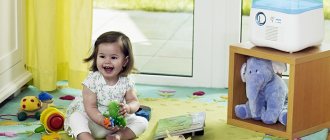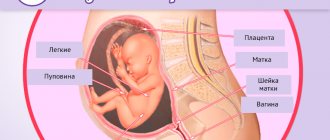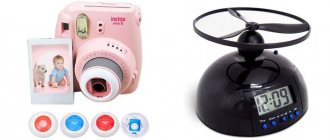Time to heal
If a child is indicated for planned hospitalization, then the parents have time to fully prepare their child, including morally.
Alas, children do not always end up in hospitals as planned. During emergency hospitalization, it is important for parents to pull themselves together and collect everything that will be useful at first. Even if you hope that the child will not be hospitalized, when going, for example, to the emergency room, take at least a change of clothes and shoes with you. It’s better to bring back what you don’t need than to have to think about what to change the child into at the hospital (if you still can’t do without inpatient treatment). Everything else can be brought later, but without clothes and shoes it will be difficult.
Medical examination
- At the clinic, the pediatrician asks the mother questions and examines the baby;
- Undresses the newborn, listens to the heart and lungs. This is possible even if the baby is crying;
- Measures head and chest circumference, height, weighs the baby;
- Palpates the abdomen (it may be swollen);
- Listens to heart murmurs;
- Spreads the hip joints;
- Sees whether the baby fixes his gaze and reacts to sound;
- Assess the condition of the skin and oral mucosa (whether there is a white coating on the tongue);
- Monitors neurological symptoms (or their dynamics, if something is discovered during patronage) - increased or decreased muscle tone, shaking hands or chin in a calm state, posture during sleep;
- Examines the baby for congenital pathology;
- Asks mother about feeding schedule and stool frequency
Alone or with parents?
Not all parents know that the “Fundamentals of the legislation of the Russian Federation on the protection of the health of citizens” clearly states that one of the parents or legal representatives of the child can stay with him in the hospital “during the entire period of his stay, regardless of the age of the child.”
In fact, if the child is over seven years old, the staff of many hospitals try by hook or by crook to get rid of the extra headache in the face of caring parents.
Just two and a half months ago, our middle son (he was not yet eight years old) was admitted to the hospital with a compound fracture of his arm. The father, who went there with him after the emergency room, was allowed to stay overnight with the child only after repeated reminders that “we have the right.” The next day I replaced my husband. And I was also regularly told that our child was “already big enough and quite independent,” but I still insisted on staying together. This hospitalization, unfortunately, was not our first, and I imagined how difficult and lonely it was for such a small child, and even traumatized, without parents.
Of course, it’s up to you to decide whether to leave your child alone. But if one of your relatives has the opportunity to be with a small (or not so small) patient, then I would still advise choosing to stay together. Although, of course, this will cause you some inconvenience. Parents usually have to sleep in the same bed with the child, or even sitting on a chair. But which loving parent will stop this? We are glad to have this opportunity.
How to make your first trip to the clinic easier
It will be easier for you if:
- Another adult will go with you
. He will sit in line while you go out for a walk with the child (or, conversely), and let you go for a card, coupon, or for other needs. Carrying a baby with you everywhere is inconvenient; - The child's clothes will be multi-layered
. The clinic may be hot or cold. Therefore, clothes should be such that you can quickly take something off (or put it on); - You will study in advance on the Internet the parameters that will be checked on your child.
Read what the baby is examined every month, why, and what the norms for these parameters are by age. It is easier for trained mothers to understand the words and actions of a pediatrician, and then you may have questions immediately at the appointment, and not after you come home.
Our family has developed a scheme that allows us to avoid sitting in line for a long time with our child: one of our relatives gets in line for an appointment in advance, an hour before the appointment, and the children and I, arriving an hour later, most often go into the office first. Yes, you can sit for the same hour during the reception, but then there will be many more sick children, nervous mothers who want to skip the line, etc.
In a hot and stuffy clinic, in a crowd of people, the child must be undressed immediately so that he does not sweat. A light hat to protect the baby from drafts will not hurt. Since there are always a lot of not entirely healthy children in the clinic, it is better to lubricate the child’s nasal passages with oxolinic ointment in advance.
Have a philosophical attitude towards people trying to jump the line. This is an inevitable evil and very difficult to combat. “I’ll just be a minute, just ask”, “I should go to the nurse and ask about the test results”, “I’m a health worker”, “on the manta - without a queue” merge into one continuous string. I even saw mothers stand up, blocking the doors to the office - but this did not greatly speed up the progress of the line. Therefore, it is better not to be nervous or angry, because your state and mood will definitely be passed on to the child!
Do not forget that the following have the right to be admitted without waiting in line:
Children with high fever; children admitted by ambulance; disabled children; children of health workers; children from large families (usually a mother and children who come notify the doctor about her arrival, and the doctor invites them to enter without waiting in line); in some clinics, children have the right to go without a queue (or through one) for examination before the Mantoux test;
Note to moms!
Hello girls! Today I will tell you how I managed to get in shape, lose 20 kilograms, and finally get rid of the terrible complexes of fat people. I hope you find the information useful!
The first visit to a children's clinic with a newborn is an important event in the life of a young mother and baby. How to choose the time and day of the visit, what you need to take with you, how to get there and how to behave on the spot, we will try to tell you about everything in the article.
When leaving the maternity hospital, you must leave information about where the baby will live - this information is transferred from the maternity hospital to the children's clinic at the child's place of stay. We emphasize that it is the place of stay, and not the place of registration. The baby is assigned to this clinic and this is where you will need to go in a month.
What to take with you
- Documents (compulsory health insurance policy, passport). Parents must also provide the results of fluorography and (not everywhere) some tests.
- Comfortable clothes in the required quantity. Keep in mind that the hospital may or may not be warm. So it’s better to provide the opportunity to warm up or undress.
- Replacement shoes
- Wet wipes (they are convenient for wiping different surfaces).
- Cups, teaspoons, knife.
- Tea leaves, sugar, salt, etc., because food in children's hospitals is often practically unsalted, cereals and tea are absolutely bland.
- Personal hygiene items.
- Towels (not all hospitals provide them).
- Oilcloth or disposable diapers (if your child is still small, it is advisable to place them under the sheet).
- Pot. Many hospitals have them, but their own, of course, is more familiar and more hygienic.
- If you plan to take gadgets, keep in mind that most hospitals have few outlets. And you may have to charge phones, tablets and other devices under someone else’s bed or take turns with your roommates. So it’s a good idea to take a tee extension cord with you.
To the clinic with a baby: useful tips and packing list
With the birth of a baby, new parents have a lot of worries. One of the most important is the health of the baby. For the first few days, pediatricians and nurses will help you. The first examination and collection of tests will be carried out in the maternity hospital, then 28 days after discharge they will come to your home for patronage. During the first year of the child’s life, it will be necessary to see specialists every month. It’s good if you have the opportunity to involve relatives: husband, grandmother, grandfather - it will be easier for you at the clinic with them.
By making a list of necessary things in advance, you can worry less and get ready for a medical examination faster. The very first and most important thing is documents: the child’s birth certificate, an extract from the maternity hospital and your passport. It is better to make copies in advance and give them to the registry for registration of the baby’s insurance policy. Place everything in a clear file and place it away from anything that could get them wet or dirty.
What will you need at the clinic?
• the child’s medical insurance policy or a copy thereof;
• vaccination certificate or vaccination certificate;
• examinations and tests done outside the local clinic;
• diapers, preferably disposable, 1-2 pieces (one for the table, the other for the scales);
• wet wipes and diapers (2-3 pieces) and a bag in which you can put used ones if necessary;
• pacifier, if you are using one. Take several at once because the pacifier may fall off. Or hang it on a special chain with a clothespin. For ease of transportation, you can use a regular small food container.
•water in a bottle. Is the child artificial? Then take the mixture in a bottle.
It’s easier with a breastfed baby; a “snack” is always nearby. A special apron for feeding or just a diaper will give you comfort - behind them you will hide from the people around you. Unfortunately, not all clinics have a special place for this.
Grab some food for yourself: cookies, fruit. Don't take sandwiches: if your trip takes too long, the food will spoil. For older children (after six months), prepare a snack. Very convenient are purees in modern packaging with a screw cap, porridge in a box with a straw, apple, banana. Plan with a small margin, because the children next to you will definitely want to join, and their mother may not have prepared as well as you.
The most relevant and useful information for modern parents is in our newsletter. We already have over 30,000 subscribers!
Age-appropriate toys will also come in handy. Take several at once, but do not give them all at once - this way you will be able to prolong the pleasure of the game. Directly in the office, you can use a toy to redirect the child’s attention if he begins to act up during examination. You can take with you a new book with bright pictures and short stories. Read to your baby. A crowd of children will immediately gather around, and the waiting will become quieter and calmer. Finger puppets will also come in handy, but be prepared for the fact that other children may also want to take part in the game.
If you wish, then take yourself a book or magazine. If the baby falls asleep, you can read.
Don't forget shoe covers. You shouldn’t rely on capsule machines or pharmacies; they are often empty or don’t work. It doesn't matter if it's slushy or dry outside. Think about the fact that even in summer you will be carrying excess dust on your shoes.
Also bring masks. They will protect you and your child from unnecessary bacteria and viruses.
Any clinic has a special “baby day” for receiving the youngest patients. Remember that the youngest patient has priority in the queue. This is due to the fact that babies are very sensitive to all kinds of infections, because they still have practically no immunity. And it is logical that, having been in contact with a sick child, your baby may also get sick.
A bag of pens can make your life a lot easier. It will be convenient to put dirty things or food in it. And it will take up very little space.
Carefully consider what your baby will wear. It will be convenient for both him and you if you choose clothes that can be easily unbuttoned, for example, a kimono bodysuit with buttons is an excellent solution. The room is almost always warm, and sometimes it can be hot, so don’t wrap your child up. In order not to worry that your baby will become hypothermic, put on light clothing in several layers, and if necessary, take it off in the wardrobe.
Put important little things like keys and money in the inside pocket - this way you will always know where they are and save yourself the hassle of searching.
Write down any questions that concern you about your pediatrician on a piece of paper at home, before your doctor’s appointment. Believe me, in the office you will forget everything from excitement.
With these simple but important tips, any visit to the doctor will not make you nervous. Remember: a calm mother means a happy baby.
Quick registration Get 5% discount on your first order!
Regime object
It is unlikely that it will be possible to organize life in a hospital like at home. The hospitals have their own, downright Spartan regime. Early rise, procedures, meals on a schedule - all this can become additional stress for the child. But children quickly adapt and learn to live by new rules.
The main thing is that mothers or fathers do not wring their hands in horror or lament, but, on the contrary, demonstrate complete equanimity with their entire appearance. Then it will be easier for children to adapt.
If your child is small, and there are older guys in the room with him, be prepared for the fact that they follow the regime very roughly. After lights out, the lights will be turned off, of course, but they won’t go to sleep. And if they are busy with their gadgets, then you will be very lucky, since they will not interfere with the kids’ sleep. But if teenagers want more communication, then get ready for the fact that you will have to choose one of two: either work as a ward Cerberus and calm the guys down, or endure midnight conversations. Therefore, I recommend stocking up on earplugs and (for a child) a sleep mask.
Time of receipt
Sometimes doctors schedule appointments themselves. If you have a choice, the following recommendations will be useful for you:
- Choose a time to go to the clinic so that it falls between your baby’s sleep periods. Then he will be well-rested, but not yet tired;
- If admission is based on coupons, sign up first or second. At the beginning of the day the queue is always smaller and you won't have to wait long;
- If you were only given a time range that is common to everyone, then come in the middle of the appointment . Everyone will want to come to the beginning, and you will sit in line for a long time;
- The best time to take is morning . No one wants to go straight from a warm bed to the clinic, so the line is shorter in the morning;
- On some days, the pediatrician sees healthy children, and on others, sick children . If you don’t want to come in vain and catch an infection, ask the reception desk in advance when they accept healthy babies;
- If there was a quarantine in the clinic, then immediately after it there will be many visitors and long queues. Therefore, if there is no special need, reschedule your visit to the pediatrician for one or two weeks.
As a rule, every clinic has a so-called infant day. This is a day (for example, Tuesday) during which all doctors work only with children under one year old. There is no need to queue up for an appointment on infant day using an electronic appointment - specialists accept patients on a first-come, first-served basis, but you need to find out better in advance. Some doctors try to admit newborns earlier than other infants, but this is at the discretion of the specialist.
How to entertain a child
For babies under two years old, take:
- Toys (they should not be too noisy, brightly glowing, etc., so as not to disturb other children and not cause fatigue with sharp monotonous sounds, melodies or light effects).
- Age appropriate books.
- Something that can be torn, crushed, twisted, thrown: paper, napkins, a small light ball or a crumb cube (it’s convenient and safe to throw it to each other).
- Tablet for drawing. It's good because it doesn't get dirty.
For older kids, life will be brightened up by:
- Books with good illustrations.
- Various mosaics and constructors
- Stringing kits
- Everything for drawing: paper, pencils, markers, etc.
- Kits for simple handicrafts: paper folding, glue-based applications,
- Plasticine. It is advisable to provide a board for modeling. It will allow you to sculpt even while sitting on the bed and will not stain hospital furniture or clothes.
- Well, and, of course, toys. In addition to your favorite ones, I advise you to buy one or two new ones, which can keep your sick baby busy for a long time and provide good entertainment. But it is advisable to save them for especially sad or difficult moments.
- Board games.
I advise you to take all this with a reserve: perhaps your roommates will want to join your games, especially if they are alone, without their parents. Longing children often “flock” to a benevolent adult who will help and support and, to some extent, replace their absent parents. Therefore, if you are lying with a child, be prepared to take care not only of him, but of all children.
Mood
In the hospital, do not forget about such an important component of recovery as a good mood. By your own example, you can show your child how to properly relate to any troubles and endure them steadfastly. Your good mood, respectful attitude towards doctors and staff, friendliness with fellow sufferers, the ability to enjoy little things and not be capricious - all this the little patient will certainly remember, “take a picture of” and it is according to this model that he will subsequently build his behavior if he has to go to hospital again. in hospital.
As you can see, hospital life can be, if not the most fun, then quite bearable. After all, we are able to support the child and entertain him, but also to ensure that the time is spent beneficially not only for the baby’s health, but also for your relationship with him. And then the days will not drag on so endlessly, and you will go home not exhausted, but having acquired something new and important. And for a child, hospital memories will not be a nightmare, but simply an experience.
What to wear for mom
It's going to be a busy day, so wear light, non-restrictive clothing and shoes. If you are a nursing mother, dress in a way that allows easy access to your breasts. Unfortunately, not every children's clinic has a special “mother and child” room. And where it exists, not all women use it, for fear of missing out in line. Therefore, most likely, you will have to feed the baby in the corridor. In special nursing clothes, you can put your baby to your breast without exposing your back and chest, and without attracting the attention of others. T-shirts, jumpers, dresses with hidden chest holes - in stores for expectant mothers and babies you can choose an outfit for every taste. But even without such “special clothing” you can adapt to feeding in public places. A blouse with buttons, a shirt worn over a T-shirt, a stole or a scarf draped over your shoulders - feed your baby calmly without the prying eyes of prying eyes.










